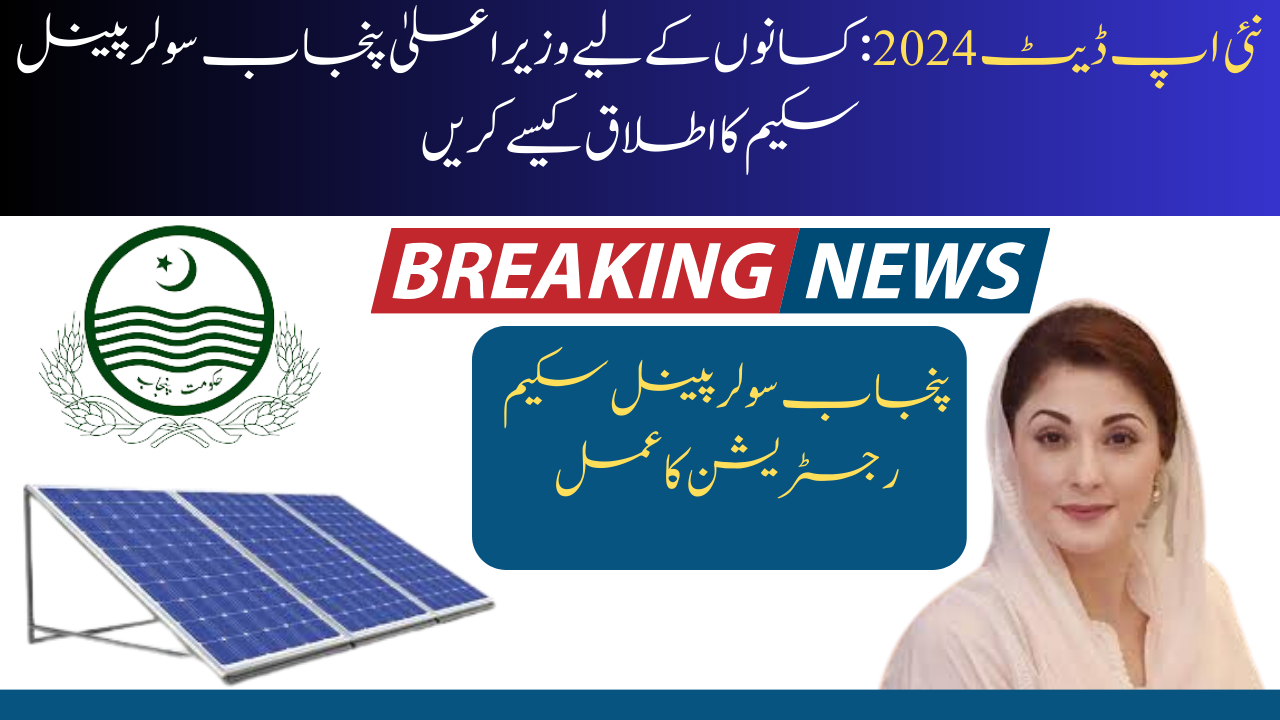CM Punjab Solar Panel Scheme For Farmers
Registration is now open for the Punjab Solar Panel Scheme. In a major initiative to strengthen Punjab’s agricultural sector, Chief Minister Maryam Nawaz Sharif has unveiled a comprehensive solar panel program specifically for farmers. With a significant budget allocation of 630 billion, this scheme aims to tackle rising electricity costs and provide farmers with a sustainable energy solution.
Punjab Solar Panel Scheme Registration Process
How to Register for the Punjab Solar Panel Scheme
Registering for the Punjab Solar Panel Scheme is straightforward. By following the steps outlined below, you can complete your registration process and check your eligibility.
Official Announcement: The Punjab government will announce the start of the registration phase through various official channels, including:
- Government websites
- Press releases
- Media announcements
- Notifications via relevant agricultural departments
Application Forms: Once registration opens, you can obtain application forms in the following ways:
- Visit the nearest branch of the Bank of Punjab
- Download forms from the official government website
Eligibility Verification: You will need to provide details to verify your eligibility, such as:
- Proof of land ownership
- Farm size documentation
- Existing electricity bills for tube-well operations
Submission Process: Submit your completed application forms and any necessary supporting documents to the designated locations. This could be the Bank of Punjab branch where you obtained the forms or a dedicated office established for the scheme.
Selection Process: The details of the selection process are yet to be revealed. It might involve a lottery system to ensure fairness, or selection could be based on specific criteria like farm size or electricity consumption.
By following these steps, you can successfully register and potentially benefit from the Punjab Solar Panel Scheme.
also read : Dynamic Survey for BISP Kafalat 10500 Check Online | 8171 Portal Apply

Objectives Of the Punjab Solar Panel Scheme
The panel scheme is a tremendous boon for farmers in today’s era. While the subsidy provided by the Punjab government is less than what might be deemed necessary, it is still a valuable support. If you haven’t registered yet, make sure to do so and take advantage of the Solar Panel Scheme. Here are the benefits of the Punjab Solar Panel Scheme for Farmers, a multifaceted initiative designed to tackle several key issues:
Financial Relief:
The scheme aims to ease the financial burden on farmers by providing solar panels for operating tube wells. With rising electricity and gas prices, this reduction in operational costs allows farmers to retain a larger portion of their hard-earned profits.
Operational Efficiency:
Switching to solar-powered tube wells enhances operational efficiency for farmers. Solar energy provides a reliable and consistent power source, minimizing disruptions from grid outages or fuel shortages. This ensures a steady water supply for crops, potentially leading to increased agricultural yields.
Environmental Sustainability:
The scheme promotes environmental sustainability by replacing fossil fuel-powered tube wells with solar alternatives. This significantly reduces carbon emissions, helping to mitigate climate change and protect the environment for future generations.
also read ;Latest News New Payment Of Ehsaas Program 2024 Starts By Monday

A Brighter Future for Punjab Agriculture
The Punjab Solar Panel Scheme for Farmers is a crucial investment in the region’s agricultural future. By providing farmers with access to clean, renewable energy, this program aims to lower operational costs, increase efficiency, and support environmental sustainability. The initiative is poised to enhance farmers’ livelihoods, boost agricultural productivity, and foster a more resilient and sustainable food system in Punjab.
Punjab Solar Panel Scheme New Registration Larest Update
According to the latest update in the solar panel scheme, new registrations are now open. If you haven’t registered yet, you should do so soon. The deadline for submitting your application is April 29, 2024. Detailed instructions for document verification and the registration process are provided in the accompanying article. Through this scheme, 50,000 families will receive free electricity, helping to alleviate the electricity shortage in Pakistan caused by rising inflation.
also read :Breaking News | 8171 Check Online Ehsaas Program Registration || Latest Update Register Now
final words
The Punjab Solar Panel Scheme for Farmers offers a significant opportunity to advance Punjab’s agricultural sector. This initiative promotes the adoption of renewable energy, reduces operational costs, and encourages environmental responsibility. By participating, farmers can gain empowerment and help shape a sustainable future for agriculture. It is crucial for Punjab’s farmers to stay informed and actively engage with this transformative program as the registration process begins.
Frequently Asked Questions (FAQ)
What Is Solar Panel Technology?
Solar panel technology refers to the systems and devices used to convert sunlight into electricity. These panels consist of photovoltaic (PV) cells that absorb sunlight and generate an electric current. This process, known as the photovoltaic effect, occurs when sunlight knocks electrons loose from atoms within the cells, creating a flow of electricity. Solar panels can be used in a variety of applications, from residential rooftop installations to large solar farms.
How Solar Panels Function
- Absorption of Sunlight: Solar panels are made of semiconductor materials, typically silicon. When sunlight strikes the surface of a solar panel, it is absorbed by the PV cells.
- Generation of Electric Current: The energy from the sunlight excites the electrons in the silicon, causing them to move and create an electric current. This movement of electrons generates direct current (DC) electricity.
- Conversion to Usable Electricity: The DC electricity is then converted to alternating current (AC) electricity using an inverter. AC electricity is what powers most homes and businesses.
Benefits of Solar Energy Beyond Cost Savings
- Environmental Impact: Solar energy is a clean and renewable resource. It reduces dependence on fossil fuels, leading to lower greenhouse gas emissions and less air pollution.
- Energy Independence: Solar energy can help reduce reliance on imported energy sources, enhancing national energy security.
- Job Creation: The solar industry creates jobs in manufacturing, installation, and maintenance.
Environmental Advantages of Solar Energy
- Mitigating Climate Change: Solar energy reduces greenhouse gas emissions by providing a clean alternative to fossil fuels. This helps slow the pace of global warming and its associated impacts.
- Reducing Air Pollution: Solar power generation does not produce air pollutants like sulfur dioxide, nitrogen oxides, and particulate matter, which are common byproducts of burning fossil fuels. This leads to improved air quality and public health benefits.
Stories of Solar Panel Scheme Development Worldwide
- India: The Indian government’s ambitious solar programs have led to significant increases in solar capacity, transforming rural areas with reliable electricity for the first time.
- Germany: Known for its Energiewende policy, Germany has become a leader in solar energy, integrating vast amounts of solar power into its grid and significantly reducing carbon emissions.
- Kenya: Solar power has revolutionized agriculture by providing off-grid solutions for water pumping and irrigation, increasing crop yields and improving food security.
Transforming Agriculture with Solar Power
Solar power has had a profound impact on agriculture in many regions. For example, in India, solar pumps have replaced diesel pumps, reducing fuel costs and carbon emissions. In Sub-Saharan Africa, solar-powered irrigation systems have enabled farmers to cultivate crops year-round, enhancing food security and livelihoods.
Addressing Potential Challenges of the Solar Panel Scheme
- Initial Costs: High upfront costs can be a barrier. Solutions include government subsidies, low-interest loans, and community financing schemes.
- Maintenance and Reliability: Ensuring the panels remain functional and efficient is crucial. Training local technicians and setting up maintenance programs can help address this.
- Grid Integration: Managing the integration of solar power into the existing grid requires upgrades and intelligent systems. Investment in grid infrastructure and smart technologies will be essential.
Long-Term Visions and Implications
The government’s long-term vision for the Farmer Solar Panel Scheme aims to make Punjab a leader in sustainable agriculture. By providing reliable and clean energy, the scheme can enhance agricultural productivity, reduce energy costs for farmers, and contribute to the state’s overall economic development. Over time, the widespread adoption of solar energy is expected to improve the quality of life in rural areas, create jobs, and help mitigate environmental issues, positioning Punjab as a model for sustainable growth.

